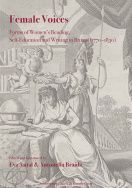
E. Antal, A. Braida, Female Voices : Forms of Women's Reading, Self-Education and Writing in Britain (1770–1830)
Le volume analyse les rapports entre écriture, éducation et lecture dans l'œuvre de femmes écrivaines britanniques entre 1770 et 1830. Il apporte une nouvelle lecture des œuvres de Mary Shelley, Mary Wollstonecraft, Mary Hays, Hannah Cowley, Maria Edgeworth, Jane Marcet, Anna Jameson, Felicia Hemans, Helen Maria Williams, Anne Radcliffe, Georgiana Cavendish, parmi d’autres. Les quatorze contributions du volume montrent la variété des genres que ses autrices choisirent afin de s’exprimer et prendre une place dans l’espace public et parfaire leur éducation. L’étude de ces différentes productions permet aussi d’analyser le questionnement des valeurs et de la place des femmes dans l’espace public et leur contribution aux transferts interculturels.
Introduction (Eva Antal and Antonella Braida)
Cross-Cultural Connections across the Channel
The Corinne Effect: British Responses to the Reading of Madame de Staël's Corinne (1807)
"Where arts have given place to arms": The Poetry of Helen Maria Williams in Paul and Virginia (1788)
Self-fashioning in the Age of Sensibility: the Duchess of Devonshire's Educational Writings
Writing the Female Self and (Self-)Education
Reflections and Thoughts on Education: from the Lady's Magazine to Mary Hays's The Victim of Prejudice (1799)
Mary Hays's Female Biography: Writing Women into the Public Sphere
Education, the Female Body and Feminine Embodiment in Mary Wollstonecraft's A Vindication of the Rights of Woman (1792)
Critical Companions: Arts-and-Sciences Education for Women and Mary Shelley's Frankenstein (1818)
Reading and Experiments in Form
War Dramatised in Hannah Cowley’s Epic Poem The Siege of Acre (1801)
Reading Mary Tighe Reading
Clara Reeve’s Epistolary Novel in the Service of Female Education: The School for Widows (1791)
Reading and Female Development in The Mysteries of Udolpho (1794)
Women’s Critical and Economic Thought
Educating to Economic Realities through Fiction: Maria Edgeworth and Jane Austen
Dispelling Economic Misconceptions: Jane Marcet’s Teaching on Political Economy
Literary Criticism as Women’s Right Activism in Anna Jameson’s Shakespeare's Heroines
Notes on Contributors
Index